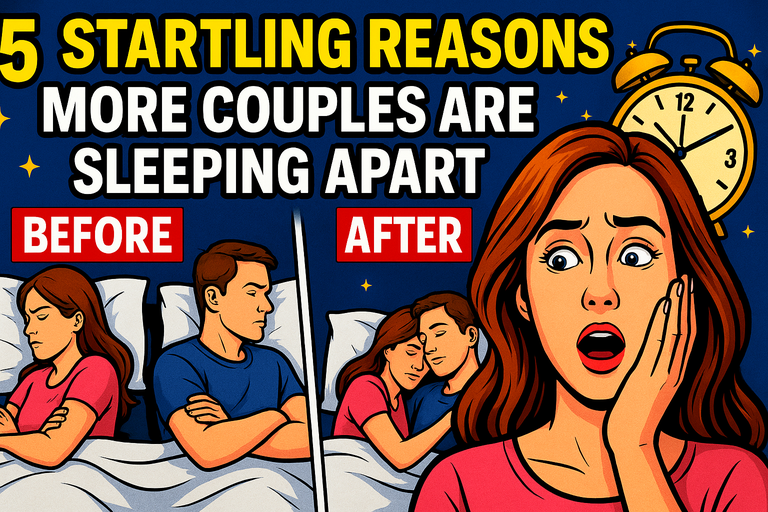
Picture this: You and your partner, once happy bedfellows, are now spending nights in separate rooms—and it’s not because anyone’s in the doghouse. Sound familiar? If it does, you’re not alone. A 2025 feature by the New York Post reveals a dramatic spike in couples agreeing to a 'sleep divorce.' But what’s really driving this huge social shift—and is your relationship at risk?
Let’s pull back the covers on why sleep divorce is suddenly everywhere, what the real dangers are, and how you can reclaim both your sleep and your connection, starting tonight.
1. Snoring: The Silent Relationship Wrecker
You’re drifting off after a long day, ready for dreamland... until the symphony of snores begins. If this scenario makes you cringe, you’re in good (if tired) company: snoring remains the #1 reason couples split up at bedtime. According to the recent NY Post article, restless nights caused by a partner’s snoring are sparking a new wave of 'sleep divorce' discussions in bedrooms everywhere.
But why does snoring strike such a nerve? Beyond the noise, chronic sleep loss leads to irritability, resentment, and even long-term relationship strain. It’s not just about comfort—it’s about connection. Are we destined to sleep alone, or is there another way?
2. Different Sleep Schedules—And the 24/7 World
We live in an always-on society. One partner may need to rise at dawn for a fitness routine, while the other is still deep into a late-night Netflix binge. These clashing natural rhythms—known as 'chronotypes'—are more pronounced than ever, especially with remote work and flexible jobs blurring the boundaries between day and night.
When compromise feels impossible, many couples opt for separate beds or even rooms. But is this just a band-aid fix, or does it create more distance in the long run?
3. The Tech Trap: Blue Light, Late-Night Scrolling, and Sleep Sabotage
Let’s be honest—those blue-lit screens are keeping a lot of us awake. If one partner snoozes while the other doomscrolls, nobody wins. The rise of personal devices means more couples are physically in bed but mentally miles apart, leading to disrupted sleep and, eventually, separate bedrooms.
The real kicker? Poor sleep isn’t just making us grumpy—it’s triggering a cascade of health risks from weakened immunity to emotional burnout.
4. Sleep Disorders Beyond Snoring—The Hidden Culprits
Sleep apnea, restless legs syndrome, and insomnia are on the rise, partly fueled by modern stress and lifestyle shifts. According to sleep experts, untreated sleep disorders in one partner can lead to chronic sleep deprivation for both, making the allure of solo slumber even stronger.
This begs the question: Are we giving up too soon, or are there innovative solutions that could help couples stay together—at least at night?
5. The Social Stigma Is Fading—But Is It Helping?
Ten years ago, separate beds might have raised eyebrows. Today, nearly 1 in 4 couples admit to sleeping apart sometimes, and social media communities are buzzing with tips for making it work. But is normalizing sleep divorce solving the root problem—or just masking it?
Experts warn that while solo sleep might offer short-term relief, it can undermine intimacy, communication, and even long-term relationship health. The question isn’t whether sleep divorce is justified—it’s whether you’re willing to fight for a solution that works for both of you.
So… What Can You Actually Do About It?
Ready for the plot twist? You don’t have to pick between restful sleep and relationship bliss. Here’s how to fight back against the sleep divorce epidemic:
- Talk it out: Open, honest conversations about sleep habits and struggles can transform frustration into teamwork.
- Set boundaries for tech: Try a 'no screens in bed' rule for a week. You might be shocked at how quickly sleep—and connection—improves.
- Invest in smart solutions: Modern anti-snoring devices, high-quality mattresses, and blackout curtains can make a huge difference.
- Get professional help: If snoring or other issues persist, see a sleep specialist. Don’t suffer in silence—help is available.
One innovative approach is using a customizable anti-snoring device. Devices that combine mandibular advancement with tongue stabilization have shown promising results in independent reviews. If you’re curious about a science-backed, comfortable solution you can personalize at home (even in your microwave!), check out these advanced anti-snoring mouthpiece options that thousands of couples are already using to sleep together again—peacefully.
The Takeaway: You Can Have Restful Sleep and a Healthy Relationship
Sleep divorce might be trending, but it’s not inevitable. Today, with smart solutions and honest conversations, you can get your relationship—and your mornings—back on track. Imagine waking up refreshed and connected. Isn’t that worth fighting for?
Have you or someone you know tried a sleep divorce? What’s worked for you, and what would you try next? Let us know in the comments—let’s help each other wake up to better mornings, together!